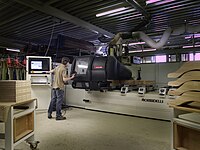
Photo from wikipedia
INTRODUCTION Shoulder complaints have high re-occurrence rates and scapular control seems to be a major influencing factor in sub-acromial impingement syndromes (SIS). Scapular dyskinesia disrupts the scapulohumeral rhythm, altering biomechanical… Click to show full abstract
INTRODUCTION Shoulder complaints have high re-occurrence rates and scapular control seems to be a major influencing factor in sub-acromial impingement syndromes (SIS). Scapular dyskinesia disrupts the scapulohumeral rhythm, altering biomechanical loads on the rotator cuff in shoulder movements. As a result, this disturbs the natural healing process. Proprioceptive Neuromuscular Facilitation (PNF) seems to be a promising treatment approach because it has a focus on motor learning. This case report seeks to illustrate the clinical reasoning and feasibility of applying the comprehensive nature of PNF in a patient who was not responsive to standard physiotherapy. CASE DESCRIPTION A 47-year-old male, a former professional handball player, was diagnosed with a SIS based upon a rotator-cuff tendinopathy, scapular dyskinesia and degeneration of supraspinatus tendon. The patient presented complaints of right sided shoulder pain in overhead activities and in reaching behind the back. PATIENT MANAGEMENT PNF-based motor-control training was provided over a period of five weeks. This approach included specified PNF-pattern exercises with specific PNF-facilitation principles and techniques. The results were improvements beyond the minimal clinical important difference and/or minimal detectable change for physical functioning, pain, range of motion, and functional disability of the shoulder. DISCUSSION AND CONCLUSION PNF provided an opportunity for motor control training, restored altered movement patterns in the patient's daily life activities. The approach addressed motor learning effects and structural impairments. PNF-patterns have been described as: "mimicking functional activities" from daily life and from sports. In cases where standard strengthening and mobilization exercises are not effective, a specified PNF-based therapy has shown to be a feasible alternative.
Journal Title: Journal of bodywork and movement therapies
Year Published: 2020
Link to full text (if available)
Share on Social Media: Sign Up to like & get
recommendations!